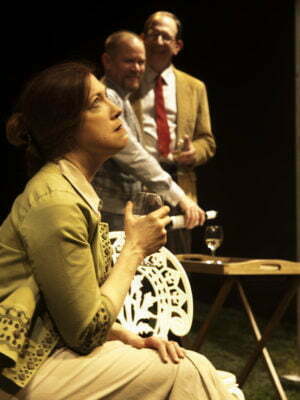Woman in Mind
Directed by Steve Scott
Produced by Eclipse Theatre Company
Playing at the Athenaeum Theatre
If there’s an American audience for Ayckbourn to be made, then Eclipse could very well make it…
Eclipse Theatre Company, whose 2013 season will feature the work of English dramatist Alan Ayckbourn, opened this week with the 1985 black comedy, Woman in Mind. The story of a middle class English hausfrau’s descent into madness, the play features Ayckbourn’s characteristic wit and bold flair for experimentation in theatrical form. Still, though director Steve Scott has delivered a successfully atmospheric production, featuring some delightfully cheeky performances by its non-Equity cast, something nonetheless feels lost in translation.
For those less-than-familiar with Ayckbourn’s immense oeuvre (the man has written over 70 plays, more than twice Shakespeare’s output), there may be a reason. Known affectionately as the Molière of the English middle classes, Ayckbourn has nonetheless endured a decades-long battle in finding receptive American audiences, especially in New York. A remarkable fact, considering Ayckbourn is one of the world’s most performed playwrights, once even having held the record for most shows simultaneously produced in London’s West End.
The reasons for Ayckbourn’s transatlantic setbacks are often thrown at the feet of disinterested American audiences. We’re either too congenitally optimistic to appreciate Ayckbourn’s acerbic wit or too dense to appreciate his peculiar subtleties—neither of which strike me as especially true (at least of the theatergoers I know). Rather, it strikes me that Ayckbourn’s plays “feel like games that the audience has to put up with rather than experiences they can share,” as Thomas Monsell wrote of them in The New York Times. And something about Ayckbourn’s characters—denizens of English suburbia, speaking with that quintessential English understatement—suggest to me people more concerned with the genteel boundaries of social class than I think Americans generally are.
 For example, take Susan (Sally Eames), the suburban housewife whose domestic frustrations are the subject of Woman in Mind. We first meet Susan while on the ground of her English garden, being tended to by her (somewhat overly) doting physician, Bill (Larry Baldacci). After having stepped on a rake, the poor thing has concussed herself, which at first actually appears to be a bit of a boon. For the hallucinations resulting from her knock on the head transport Susan to a different life—one with an adoring and handsome husband (James Houton), a beautiful daughter (Jess Berry), and a spirited younger brother (Phil Higgins). A picturesque projection of her ideal life—spent laughing over glasses of champagne and fussing over her would-be daughter’s wedding—the fantasy, of course, is too good to be true.
For example, take Susan (Sally Eames), the suburban housewife whose domestic frustrations are the subject of Woman in Mind. We first meet Susan while on the ground of her English garden, being tended to by her (somewhat overly) doting physician, Bill (Larry Baldacci). After having stepped on a rake, the poor thing has concussed herself, which at first actually appears to be a bit of a boon. For the hallucinations resulting from her knock on the head transport Susan to a different life—one with an adoring and handsome husband (James Houton), a beautiful daughter (Jess Berry), and a spirited younger brother (Phil Higgins). A picturesque projection of her ideal life—spent laughing over glasses of champagne and fussing over her would-be daughter’s wedding—the fantasy, of course, is too good to be true.
Back in the “real world,” Susan’s husband is the tawdry local vicar (Ted Hoerl), more invested in his 60-page history of his parish than in Susan’s inner emotional life. And her sister-in-law, Muriel (Jeannie Affelder), is a neurotic fit longing to make contact with her dead husband. And as for Susan’s son, Rick (Jack Miggins)—well, Rick rather preferred to join a Trappist order of monks (under vows of silence) than speak to his own mother. Is it any wonder then that Susan allowed herself to lapse into fantasy? Still, such holidays eventually take their toll as fantasy and reality converge, and Susan’s dreams quickly morph into a menacing nightmare.
Now is it just me, or is there something about Susan’s gradual breakdown that feels like a punishment for being unhappy? That is, either Susan goes insane because she is the random victim of impersonal circumstance (which seems to undermine Woman in Mind’s notably psychological point of view) or else Susan goes insane because something has decreed that she must. And if the latter, then either Susan is punishing herself or Ayckbourn is punishing Susan.
Regardless of which, the reason is clear enough. Susan is meant to accept the circumscriptions of her class, her gender and her domestic function without question. To fantasize about something else threatens the boundaries which have been placed deliberately around her, the limits meant to reign her in. (And isn’t it more than slightly strange that when Susan fantasizes about being free from being someone’s wife and mother, what she fantasizes about is being someone else’s wife and mother?) Even Susan’s dreams are apparently kept on a short leash.
Still, such questions, ambiguities, moral equivocations, and uncertainties are also what make Ayckbourn’s plays such tremendous fun. And the fact that we can never really be certain what Ayckbourn’s intentions are—or rather, to what extent he is secretly manipulating Susan’s fate—is also what makes Susan one of the most compelling female roles of the modern stage. So much of her neuroses is found in the tension between her simultaneously being a person with an interior life but also a social role defined by others—for example, her husband and her son (and perhaps even her author).
fun. And the fact that we can never really be certain what Ayckbourn’s intentions are—or rather, to what extent he is secretly manipulating Susan’s fate—is also what makes Susan one of the most compelling female roles of the modern stage. So much of her neuroses is found in the tension between her simultaneously being a person with an interior life but also a social role defined by others—for example, her husband and her son (and perhaps even her author).
Thankfully, Sally Eames’s performance as Susan is firmly compelling, with a fiery intensity and an almost conscious awareness of the contrived circumstances her life has presented to her. Her Susan is never so much a docile victim of her life as she is a woman who cannot bear herself anymore and on some level accepts insanity as the price she must pay for once daring to settle for less. As for the rest of the cast, each brings immense color to the stage in their quirky and nuanced characterizations, with notable supporting performances from Jeannie Affelder as Susan’s hysterically overwhelmed sister-in-law, Muriel, and Larry Baldacci as the lugubriously pathetic GP, Bill.
Therefore, if Woman in Mind should be any indication of the season to come from Eclipse, we can all look forward to a thought-provoking year. For if there is a case for an American audience for Ayckbourn, it appears to me that Eclipse is more than prepared to make it. And although I remain far from convinced there is, I’m still excited to hear the arguments…
RECOMMENDED
Reviewed by Anthony J. Mangini
Running time is approximately two hours with one intermission.
Woman in Mind runs until May 19th, 2013. The Athenaeum Theatre is located at 2936 N. Southport Ave., Chicago, IL 60657. For tickets call the Athenaeum Theatre box office at (773) 935-6875 or visit www.eclipsetheatre.com.


